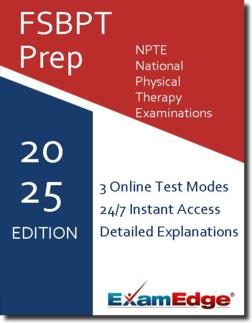NPTE - National Physical Therapy Examinations (NPTE) Practice Tests & Test Prep by Exam Edge - Test Reviews
Based on 34 Reviews
- Real Exam Simulation: Timed questions and matching content build comfort for your NPTE - National Physical Therapy Examinations test day.
- Instant, 24/7 Access: Web-based National Physical Therapy Examinations practice exams with no software needed.
- Clear Explanations: Step-by-step answers and explanations for your FSBPT exam to strengthen understanding.
- Boosted Confidence: Reduces anxiety and improves test-taking skills to ace your National Physical Therapy Examinations (NPTE).

NPTE - National Physical Therapy Examinations (NPTE) Practice Tests & Test Prep by Exam Edge - Review
National Physical Therapy Examinations - Reviews
Excellent
Based on
170
reviews
“ Excellent and great price!!
Jessica , Woodbridge, Virginia
See why our users from 154 countries love us for their exam prep! Including 34 reviews for the NPTE - National Physical Therapy Examinations exam.
Exam Edge is an Industry Leader in Online Test Prep. We work with our Institutional Partners to offer a wide array of practice tests that will help you prepare for your big exam. No Matter how niche field of interest might be, were here to help you prepare for your test day.
| 2.8M | 4.5M | |
| Users | Tests Taken | |
| 100K | 19 | |
| Unique Exams | Years in Business | |


